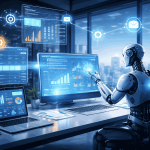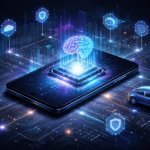
AI Replace Human Modelers: The Future of Simulation
Will AI replace human modelers in the coming years? It’s a question many in tech and engineering are asking. As artificial intelligence (AI) becomes more advanced, automation is taking over complex tasks. But can it truly replace human creativity and decision-making in simulation?
In this article, you’ll learn how AI is changing simulation, what roles human modelers still play, and where the balance may lie between machine and human expertise.
Understanding Simulation and the Role of Human Modelers
Simulation involves creating virtual models of real-world systems to test ideas without physical experiments. Traditionally, human have designed these simulations using deep knowledge of physics, engineering, and data analysis.
But with AI advancing, tools now promise to automate parts of this process. The big question remains: will AI replace human entirely—or will they work side by side?
How AI Is Transforming Simulation Processes
AI brings speed and efficiency. It can process large datasets, identify patterns, and optimize simulations faster than humans. This automation saves time in industries like:
-
Aerospace
-
Healthcare
-
Automotive
-
Manufacturing
For example, machine learning algorithms can fine-tune models or even generate simulation scenarios on their own. Some experts suggest this might make human modelers less needed in certain tasks.
However, automation also has limits. AI lacks intuition and understanding of context—something only humans can provide. Therefore, even as AI improves, it doesn’t fully eliminate the need for human modelers.
The Balance: Automation vs Human Expertise
Will AI replace human modelers completely? The answer likely lies in balance.
Humans bring creativity, ethical thinking, and domain expertise. AI handles repetitive, data-heavy work. Together, they form a powerful team where AI assists but doesn’t entirely take over.
Here’s where human expertise still stands out:
Key Roles for Human Modelers
-
Setting simulation goals
-
Defining ethical boundaries
-
Validating AI-generated results
-
Interpreting complex outcomes
-
Innovating new simulation methods
Instead of replacement, AI is augmenting the work of human modelers, allowing them to focus on higher-level tasks.
Challenges AI Faces in Replacing Human
Even though AI is improving, it faces challenges:
-
Data quality issues – AI relies on clean, accurate data to work well.
-
Lack of context – AI can’t always understand why a result matters.
-
Explainability problems – AI decisions are sometimes “black boxes” that humans struggle to interpret.
Because of these challenges, AI replace human isn’t a simple yes or no. Humans are still needed to guide, check, and improve AI systems.
Industries Watching This Shift Closely
Industries relying on simulation are closely watching AI’s progress. Fields most affected include:
-
Engineering design
-
Financial modeling
-
Drug development
-
Climate science
These sectors demand high accuracy and accountability. Therefore, full automation without human oversight is risky. Human modelers continue playing critical roles in verifying results.
What Does the Future Hold?
In the next decade, expect more AI tools integrated into simulation workflows. But humans will remain vital to set objectives, check assumptions, and ensure ethical outcomes.
Companies that invest in AI replaces human technology should also invest in training their teams to work alongside AI. This balance can lead to better, faster, and safer simulations.
Frequently Asked Questions
Will AI fully automate simulation modeling?
No, AI will likely automate specific tasks but not fully replace human expertise.
What skills will human modelers need in the AI era?
Human modelers will need skills in AI oversight, ethical design, data validation, and critical thinking.
Which industries will adopt AI-driven simulation first?
Industries like automotive, aerospace, and pharmaceuticals are already adopting AI-driven simulation tools.
Is AI more accurate than human modelers?
AI can be faster and process more data, but accuracy still depends on human-defined goals and data quality.
Working Together, Not Replacing
While it’s tempting to ask, “Will AI replaces human?”, the more realistic scenario is collaboration. AI will automate repetitive parts, but humans will continue to lead creative, ethical, and strategic aspects.
The future of simulation is not a battle between AI and humans—it’s a partnership.
Author Profile

- Online Media & PR Strategist
- Hello there! I'm Online Media & PR Strategist at NeticSpace | Passionate Journalist, Blogger, and SEO Specialist
Latest entries
 AI WorkflowsJanuary 30, 2026Agentic AI Workflows for Automating Business Tasks
AI WorkflowsJanuary 30, 2026Agentic AI Workflows for Automating Business Tasks Cloud ComputingJanuary 27, 2026Multi-Hybrid Strategy for Cloud Resilience and Vendor Freedom
Cloud ComputingJanuary 27, 2026Multi-Hybrid Strategy for Cloud Resilience and Vendor Freedom AI WorkflowsJanuary 26, 2026On Device AI Processing for Faster, Private Mobile Interfaces
AI WorkflowsJanuary 26, 2026On Device AI Processing for Faster, Private Mobile Interfaces AI WorkflowsJanuary 23, 2026AI Driven Threats: Deepfakes, Ransomware, and New Rules
AI WorkflowsJanuary 23, 2026AI Driven Threats: Deepfakes, Ransomware, and New Rules

